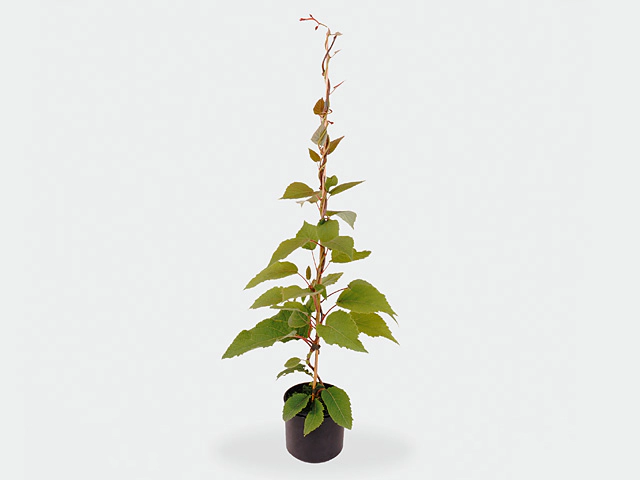Actinidia deliciosa

| soil pH requirement | Neutral (pH 6,5 - 7,5); Indifferent |
| Light conditions | Sunny; Semi-shades |
Actinidia deliciosa, commonly known as kiwifruit or Chinese gooseberry, is a highly sought-after fruit for its unique and refreshing taste. The plant thrives in various climate conditions and can be cultivated in different regions around the world. However, to ensure the optimal growth and productivity of kiwifruit, certain soil pH and light conditions need to be met.
One essential factor for successful kiwifruit cultivation is the soil pH requirement. Actinidia deliciosa prefers a neutral soil pH, ranging from 6.5 to 7.5. This pH range provides the ideal conditions for the plant's root development and nutrient absorption. Acidic or alkaline soil can hinder the plant's growth and lead to nutrient deficiencies. Therefore, it is crucial to test the soil pH and make amendments if necessary to create a suitable environment for kiwifruit.
In terms of light conditions, Actinidia deliciosa thrives best in sunny areas. Kiwifruit plants require ample sunlight exposure for photosynthesis, which is essential for their growth and fruit production. Planting kiwifruit in an area with at least six hours of direct sunlight per day ensures optimal fruit development and sweetness. However, it is worth noting that kiwifruit plants can tolerate partial shade if full sun exposure is not available. Semi-shaded areas can still provide acceptable growth conditions, but the fruit quality and yield may not be as high as those exposed to full sunlight.
It is important to consider these requirements when planning to grow kiwifruit commercially or in your garden. If the soil pH is too acidic or alkaline, it is advisable to amend it by adding organic matter, lime, or sulfur, depending on the need for adjustment. Regular monitoring of the soil pH is also recommended to ensure the pH remains within the suitable range. Additionally, selecting a location with sufficient sunlight or providing additional support systems like trellises can optimize kiwifruit plant growth.
Kiwifruit, being a nutrient-dense fruit, provides numerous health benefits. It is rich in vitamin C, potassium, and dietary fiber, making it a great addition to a balanced diet. The distinct taste and versatility of kiwifruit also make it a popular choice for various culinary creations, from fruit salads, smoothies, desserts to savory dishes.
In conclusion, Actinidia deliciosa, or kiwifruit, requires a neutral soil pH ranging from 6.5 to 7.5 for optimal growth. Additionally, ample sunlight exposure is preferred, although semi-shaded areas can still support kiwifruit cultivation to some extent. By providing the right soil conditions and light exposure, growers can enjoy a bountiful harvest of this delicious and nutritious fruit.
Market availability index by month:
| Jan. | Feb. | Mar. | Apr. | May | Jun. | Jul. | Aug. | Sep. | Oct. | Nov. | Dec. |
|---|---|---|---|---|---|---|---|---|---|---|---|
| 1 | 2 | 1 | 1 | 3 | 4 | 1 | 1 | 1 | 1 | 1 | 1 |